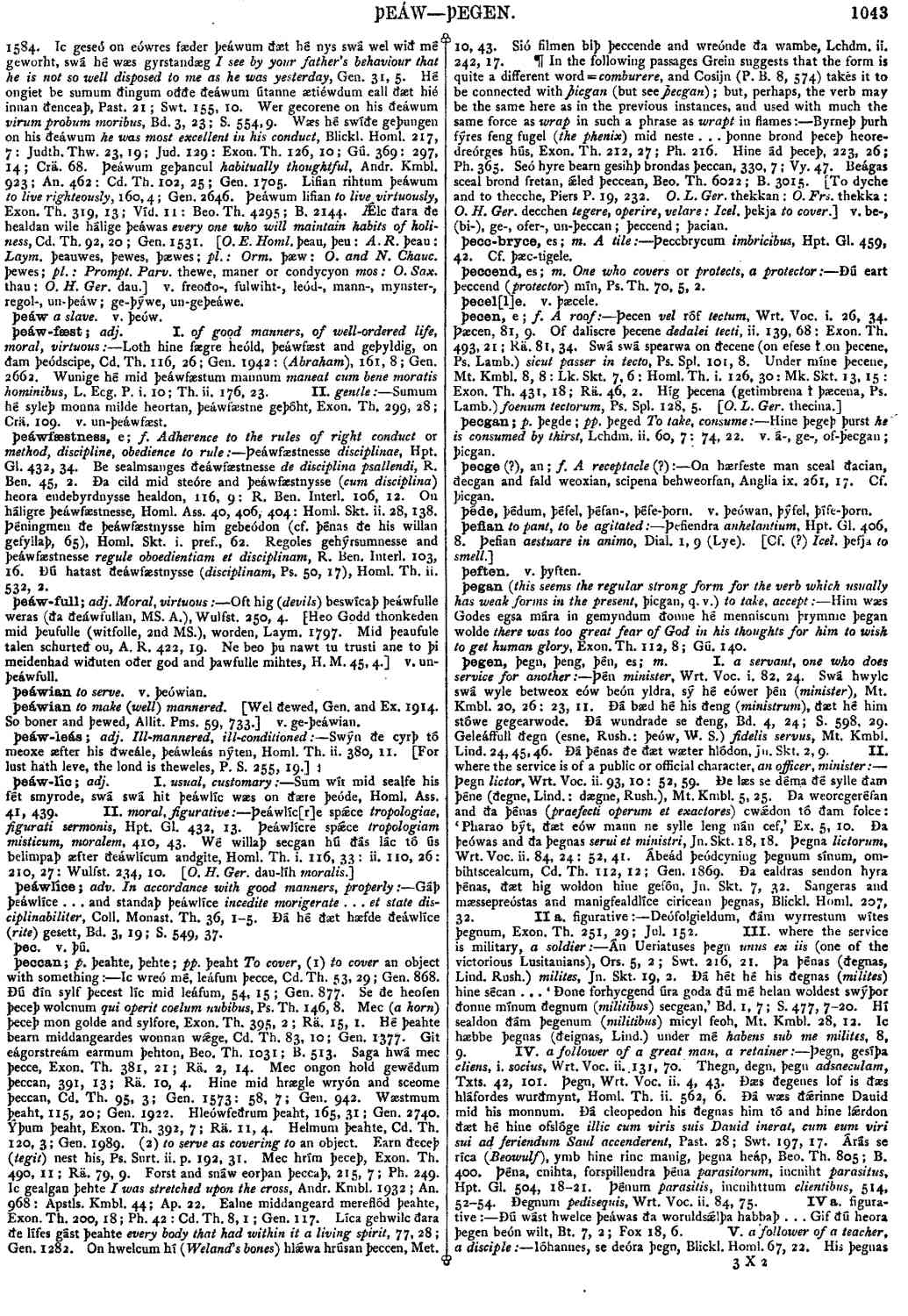þeccan
- verb [ weak ]
-
Ic wreó mé, leáfum þecce,
- Cd. Th. 53, 29; Gen. 868.
-
Ðú ðín sylf þecest líc mid leáfum,
- 54, 15; Gen. 877.
-
Se ðe heofen þeceþ wolcnum
qui operit coelum nubibus,
- Ps. Th. 146, 8.
-
Mec (
a horn
) þeceþ mon golde and sylfore,- Exon. Th. 395, 2; Rä. 15, 1.
-
Hé þeahte bearn middangeardes wonnan wǽge,
- Cd. Th. 83, 10; Gen. 1377.
-
Git eágorstreám earmum þehton,
- Beo. Th. 1031; B. 513.
-
Saga hwá mec þecce,
- Exon. Th. 381, 21; Rä. 2, 14.
-
Mec ongon hold gewédum þeccan,
- 391, 13; Rä. 10, 4.
-
Hine mid hrægle wryón and sceome þeccan,
- Cd. Th. 95, 3; Gen. 1573: 58, 7; Gen. 942.
-
Wæstmum þeaht,
- 115, 20; Gen. 1922.
-
Hleówfeðrum þeaht,
- 165, 31; Gen. 2740.
-
Ýþum þeaht,
- Exon. Th. 392, 7; Rä. 11, 4.
-
Helmum þeahte,
- Cd. Th. 120, 3; Gen. 1989.
- Andr. Kmbl. 1932;
An. 968: Apstls. Kmbl. 44; Ap. 22. Ealne middangeard mereflód þeahte, Exon. Th.
200, 18; Ph. 42: Cd. Th. 8, 1; Gen. 117. Líca gehwilc ðara ðe lífes gást þeahte
every body that had within it a living spirit, 77, 28; Gen.
1282. On hwelcum hí (Weland's bones) hlǽwa hrúsan þeccen, Met.
10, 43. Sió filmen biþ þeccende and wreóde ða wambe, Lchdm. ii. 242, 17. ¶ In the
following passages Grein suggests that the form is quite a different word =
comburere, and Cosijn (P. B. 8, 574) takes it to be connected
with þicgan (but see, þecgan); but, perhaps,
the verb may be the same here as in the previous instances, and used with much the
same force as wrap in
-
Byrneþ þurh fýres feng fugel (
the phenix
) mid neste ... þonne brond þeceþ heoredreórges hús,- Exon. Th. 212, 27; Ph. 216.
-
Hine ád þeceþ,
- 223, 26; Ph. 365.
-
Seó hyre bearn gesihþ brondas þeccan,
- 330, 7; Vy. 47.
-
Beágas sceal brond fretan, ǽled þeccean,
- Beo. Th. 6022; B. 3015.
Bosworth, Joseph. “þeccan.” In An Anglo-Saxon Dictionary Online, edited by Thomas Northcote Toller, Christ Sean, and Ondřej Tichy. Prague: Faculty of Arts, Charles University, 2014. https://bosworthtoller.com/31600.
Checked: 0